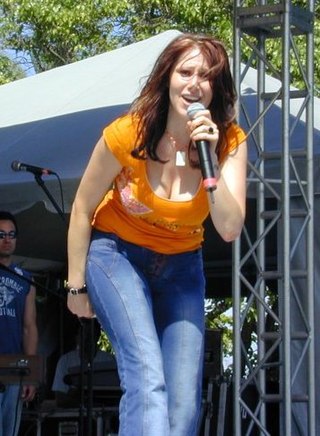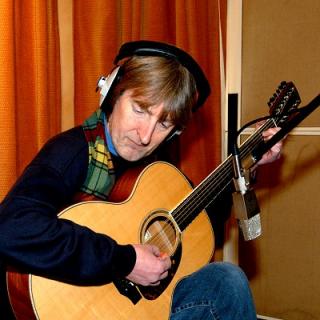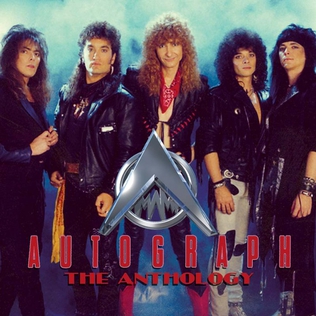
Tiffany Renee Darwish, known mononymously as Tiffany, is an American pop singer. Her 1987 cover of the Tommy James and the Shondells song "I Think We're Alone Now" spent two weeks at No. 1 on the Billboard Hot 100 chart, and was released as the second single from her debut studio album Tiffany.

An album is a collection of audio recordings issued on a medium such as compact disc (CD), vinyl (record), audio tape, or digital. Albums of recorded sound were developed in the early 20th century as individual 78 rpm records (78s) collected in a bound book resembling a photo album; this format evolved after 1948 into single vinyl long-playing (LP) records played at 33+1⁄3 rpm.

Anthony Edwin Phillips is an English musician, songwriter, producer and singer who gained prominence as the original lead guitarist of the rock band Genesis, from 1967 to 1970. He left in July 1970 and learned to play more instruments, before he began a solo career. His departure from Genesis on the eve of the group's breakthrough to mainstream popularity has led him to be dubbed "the Pete Best of progressive rock".

Lead Me On is the eighth studio album by Christian music singer-songwriter Amy Grant, released in 1988 through A&M Recordings.
National Health were an English progressive rock band associated with the Canterbury scene. Founded in 1975, the band featured members of keyboardist Dave Stewart's band Hatfield and the North and Alan Gowen's band Gilgamesh, including guitarists Phil Miller and Phil Lee and bassist Mont Campbell as original members. The band was named after Stewart's National Health spectacles. Bill Bruford was the initial drummer, but was soon replaced by Pip Pyle. Campbell was replaced by Neil Murray and then John Greaves. Alan Gowen left the group before its first album, but returned for their final tours, replacing Dave Stewart, who resigned after their second album. Amanda Parsons sang with the group in its original lineup but also appeared on the first album only as a guest; the group never had another full-time vocalist, although Richard Sinclair appeared a few times as a guest vocalist, and Greaves sang on one track of the second album and occasionally in concerts. Guitarist Phil Miller was National Health's only constant member.
Autograph was an American hard rock band formed in Los Angeles, California, in 1983. The band is best known for their 1984 hit song "Turn Up the Radio".
The Inventions and Sinfonias, BWV 772–801, also known as the Two- and Three-Part Inventions, are a collection of thirty short keyboard compositions by Johann Sebastian Bach (1685–1750): 15 inventions, which are two-part contrapuntal pieces, and 15 sinfonias, which are three-part contrapuntal pieces. They were originally written as Praeambula and Fantasiae in the Klavierbüchlein für Wilhelm Friedemann Bach, a clavier-booklet for his eldest son, and later rewritten as musical exercises for his students.
Péchés de vieillesse is a collection of 150 vocal, chamber and solo piano pieces by composer Gioachino Rossini, who was best known for his operas. The pieces are grouped into fourteen unpublished albums under this self-deprecating and ironic title. The ordering of the pieces in the albums does not reflect the sequence or the dates of their composition, which range from 1857 to shortly before Rossini's death in 1868. The title Péchés de vieillesse was given by Rossini only to volumes V to IX but has been applied to all. The collection is salon music, though of a refined order, meant to be performed in the privacy of Rossini's drawing room at Passy. Volumes I, II, III and XI are vocal music to piano accompaniment. Volumes IV, V, VI, VII, VIII, X and XII are music for solo piano. Volume IX is for chamber ensemble or solo piano. Volumes XIII and XIV comprise vocal and non-vocal music.

"Turn Up the Radio" is a song by American glam metal band Autograph. Released as the lead single from the band's 1984 debut album, Sign In Please, the song peaked at number 29 on the US Billboard Hot 100 on March 16, 1985, and number 17 on the Mainstream Rock Tracks on January 26, 1985. The song's accompanying music video also received a significant amount of airplay on MTV, ultimately boosting sales and popularity.

Loud and Clear is the third studio album by American rock band Autograph, released in 1987. It would be the final album to feature original material by all five original members. The band would not issue another release until 1997. Two of the tracks featured on this album, "Dance all Night" and "She Never Looked that Good For Me" appeared in the 1987 fantasy-comedy film Like Father Like Son, released the same year. The original album issue, by RCA Records is out of print. The album was reissued on CD in 2006 by Rock Candy Records.

Missing Pieces is a digital album by Scottish rock band Biffy Clyro, released 14 May 2009. The album features B-sides from singles released from the band's 4th album Puzzle.

Kamikyokutachi is the second compilation album by the Japanese idol group AKB48. It was released in Japan on April 7, 2010, and contains 16 songs, 14 of which had been previously released as singles. The album topped the weekly Oricon Albums Chart.

Shankar Family & Friends is an album by Indian musician Ravi Shankar, recorded primarily in Los Angeles during the spring of 1973, but not released until late 1974. It was produced by Shankar's friend George Harrison and one of the first releases on the ex-Beatle's Dark Horse label. Out of print for many years, and much sought after as a result, the album was remastered in 2010 and reissued as part of the Ravi Shankar–George Harrison box set Collaborations.

Missing Pieces is a 2001 compilation album by Talk Talk. The first six tracks are the A- and B-Sides of the three CD singles released in 1991 for their final album Laughing Stock. Four of these are versions of album tracks, with the addition of the otherwise uncollected B-Sides "Stump" and "5:09". The final track, "Piano", was recorded pseudonymously by Mark Hollis for the 1998 album "AV 1" by Allinson / Brown, which was produced by former Talk Talk producer Phill Brown. According to Hollis, it was designed to cycle indefinitely for a Dave Allinson/Phill Brown art exhibition and is presented twice in a row on the CD. Missing Pieces was released in 2001 to a generally mixed to positive reception.
Missing Pieces may refer to:

Aftermath of the Lowdown is the third solo studio album by Richie Sambora which was released in Japan on September 12, 2012, in the United Kingdom on September 17, and in the United States on September 18, 2012 as digital download and on September 25, 2012 as physical CD. For the first time in his 30-year career, Sambora signed with an independent label, Dangerbird.

Picking Up the Pieces is the twelfth studio album from American singer-songwriter Jewel, released on September 11, 2015, through Sugar Hill Records. Self-produced, the album is said to be a bookend to her 1995 debut album, Pieces of You.

Prelude and Fugue in E minor, BWV 548 is a piece of organ music written by Johann Sebastian Bach sometime between 1727 and 1736, during his time in Leipzig. The work is sometimes called "The Wedge" due to the chromatic outward motion of the fugue theme. Unlike most other organ preludes and fugues of Bach, the autograph fair copy of the score survives, though the handwriting changes twenty two measures into the fugue to the hand of Johann Peter Kellner, a likely pupil and acquaintance of Bach who played an important role in the copying of his manuscripts. Because of the work's immense scope, it has been referred to as "a two-movement symphony" for the organ.

The Anthology is the only compilation album by American glam metal band Autograph. Released as a two-disc set in 2011, it is a digital remaster of two Autograph albums, Missing Pieces and Buzz. The first disc is a remaster of Missing Pieces, reissued as "Studio Demos 1983-1988", and contains additional tracks from the 2003 album More Missing Pieces, while the second disc is the digital remaster of Buzz, reissued as Buzz and Beyond with two additional versions of "Turn Up the Radio", a re-recorded version which was first featured on Steve Plunkett's My Attitude album and an acoustic version listed as "unplugged".

Ave Maria is a short motet for SATB chorus by Russian composer Igor Stravinsky.















